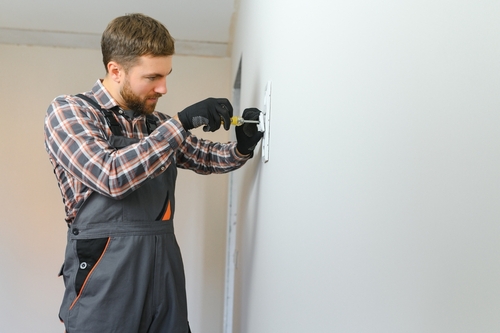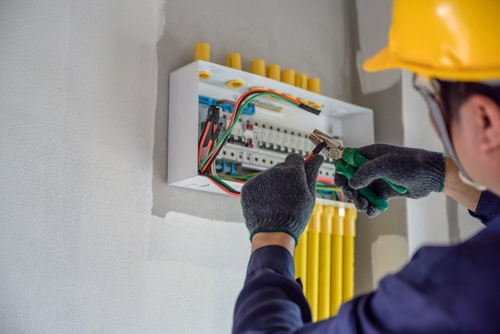May 8, 2025
The Homeowner’s Guide to Upgrading Electrical Wiring

An electrical wiring upgrade is one of the most important improvements you can make on your home. From flickering lights to outdated fuses to inefficient electrical capacity, an out-of-date wiring system can seriously impact your home’s safety and efficiency.
Older homes needed far less power than modern ones, and they relied on outmoded technology that ultimately costs you more in energy bills each month. Risks of outdated wiring include electrical fires, power outages, tripped circuit breakers, and more.
By updating your electrical wiring with a licensed electrician like the ones at Applewood, you can save money, power all your home’s devices, improve its safety—and even increase your home value.
If you’re not sure when your home’s panel or wiring was last inspected, it’s a great time to call Applewood’s licensed electricians for an inspection.
Signs You Need an Electrical Wiring Upgrade
Be on the lookout for these signals that your electrical system could use an update:
- Frequent breaker trips or blown fuses
- Flickering lights or buzzing outlets
- Two-prong (ungrounded) outlets
- Outdated materials like knob-and-tube or aluminum wiring
- Lack of GFCI outlets in kitchens and bathrooms
If any of these apply to your older home, don’t wait to call a licensed electrician. Wiring updates are important for the maintenance and overall value of your home.
What Does an Electrical Wiring Upgrade Involve?

An inspection will uncover exactly what type of electrical rewiring project your home needs. No matter the results, an electrical wiring upgrade will bring your home up to modern safety and efficiency standards. Whether you’re in an older home or planning a renovation, here’s what to expect during an electric wiring upgrade:
1. Electrical System Assessment
A licensed electrician’s inspection will evaluate your existing wiring, breaker panel, outlets, and switches. The goal is to identify safety risks and code violations and create a plan for the necessary repairs.
2. Full vs. Partial Rewiring
In some homes, simple updates like replacing old circuits or grounding outlets are all that’s required. But in others—especially older homes with aluminum or knot-and-tube wiring, which are common to the Denver-Boulder-Longmont area—a complete electrical wiring upgrade is usually recommended.
3. Breaker Panel Upgrades
Modern houses require more power than older homes thanks to newer technology like appliances, home offices, and EV chargers. This means outdated fuse boxes or undersized panels may need to be replaced with an entirely new panel.
4. New Outlets, Switches, & Fixtures
Another common upgrade is swapping outdated electrical accessories for modern ones. Your electrician may recommend adding more outlets, opting for newer options like GFCIs in bathrooms and kitchens, and adding tamper-resistant receptacles for increased safety. Light fixtures, dimmers, and smart switches may also be replaced to meet the current code.
5. Code Compliance & Permits
A good electrician will handle permitting and inspections to ensure your updates are safe, legal, and up to local and national electrical codes.
How Much Does It Cost To Upgrade Electrical Wiring?
Several factors influence the cost, including the size of your home, the condition of your existing wiring, the need for drywall removal and repair, and local averages.
Costs in the Denver metro area, including Boulder and Longmont, tend to run higher than national averages because of higher labor rates and permitting requirements. Some neighborhoods, like Capitol Hill or Park Hill, have more older homes than average. Residents there will often pay more for their electrical updates because of additional upgrades like panel replacements or grounding system installations.
Factors That Affect Rewiring Costs
- Age of the home: Older homes may have unsafe or obsolete wiring (e.g., aluminum, knob-and-tube)
- Scope of work: Full home rewiring vs. partial updates
- Electrical panel size and condition
- Permits and inspections
- Accessibility of wiring (open walls vs. finished interiors)
Financing and Value
It’s easy to put off your electrical upgrade due to the cost of rewiring, but the benefits far outweigh the costs. If the sticker price feels daunting, you can take advantage of Applewood’s flexible financing options. Home wiring updates are one of the best investments you can make in your home, so don’t wait to call your local Applewood service provider.

Benefits of Upgrading Your Home’s Electrical System
A modern, efficient electrical system has many long-term financial benefits: lower energy bills, a higher home resale value, and lower insurance premiums, to name a few. Your home will also be better equipped to handle the needs of modern appliances and upgrades like EV chargers. Plus, it’s hard to put a price on peace of mind knowing your home is safer than before.
Why You Should Always Hire a Licensed Electrician
Performing your own electrical updates isn’t just a bad choice, it’s a potentially dangerous one. DIY risks include fire, electrical shock, and failed inspections—and often, you’ll find you’d spend less time and money if you had opted for a professional from the start.
A licensed electrician ensures compliance with local and national codes, handles all the permits, and comes with years of professional experience.
Applewood’s licensed electricians have served the Denver, Boulder, and Longmont areas for over 51 years. They’re backed by our two-year warranty and code of ethics.
Take the First Step Toward a Safer, Smarter Home
An electrical wiring update is one of the best investments you can make in your home. Your home will be safer and more efficient, and you’ll save money.
Ready to upgrade your electrical system? Applewood’s expert electricians are standing by ready to serve your needs. Get a quote and make your home safer today!


